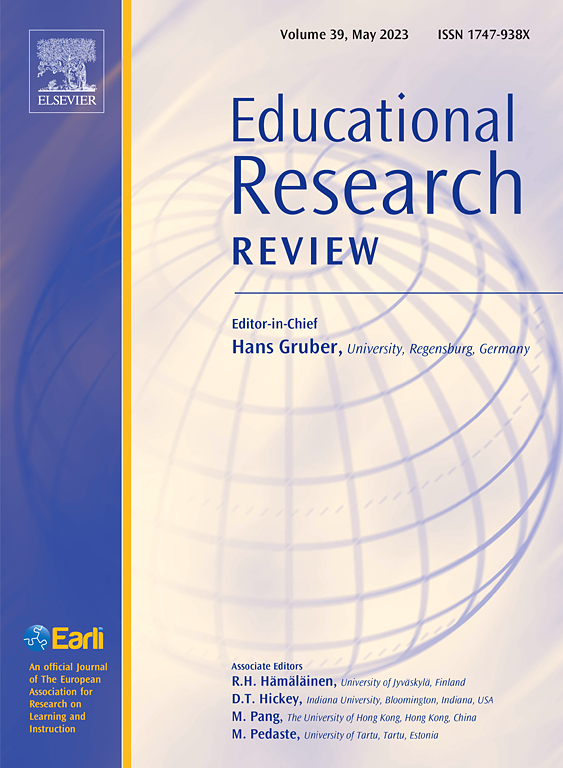教育活动对社会科学和人文学科职业认同形成的影响:一个范围回顾
IF 10.6
1区 教育学
Q1 EDUCATION & EDUCATIONAL RESEARCH
引用次数: 0
摘要
高等教育课程越来越强调专业身份形成(PIF),特别是在医学和教师教育等领域。社会科学和人文学科(SSH)的课程也越来越多地认识到它们在为学生的职业未来做准备方面的作用,然而这些学科中关于PIF的知识很少融入到文献中。这个范围审查综合了关于SSH项目中各种教育活动对PIF的影响的知识。一项全面的搜索确定了63项相关研究。SSH项目中的教育活动被观察到在三种情况下对PIF有贡献:教室和课程作业、现实生活项目和实习。这些活动对PIF产生了三种影响:专业形象的形成,专业背景下的体验式学习,以及对专业定位的自我反思。然而,与医学和教学教育相比,SSH学科通常与特定职业的联系不太明确,这一事实使PIF变得复杂。此外,在SSH学科中也存在着学科之间的实质性差异。本文提出了一个模型,该模型有助于理解增强职业认同(PI)的活动与学生成绩之间的关系如何取决于环境。该模型建立在一个假设的基础上,即可以使用四个参数来评估pi增强活动的应用和效果:学习环境、学生角色、知识的相关性和支持。这些参数嵌入到连接教育和专业领域的配置中,这些配置根据学科、教育阶段、专业要求、教师属性和个别学生的条件而变化。这个初步的模型可以通过进一步的研究得到验证,并有可能为研究和课程设计提供信息。本文章由计算机程序翻译,如有差异,请以英文原文为准。
The impact of educational activities on professional identity formation in social sciences and humanities: a scoping review
Higher education programs increasingly emphasize professional identity formation (PIF) within their curricula, particularly in fields such as medicine and teacher education. Programs in social sciences and humanities (SSH) also increasingly recognize their role in preparing students for professional futures, yet knowledge on PIF in these disciplines is less integrated into the body of literature. This scoping review synthesizes knowledge regarding the impact of various educational activities on PIF within SSH programs. A comprehensive search identified 63 relevant studies. Educational activities within SSH programs were observed to contribute to PIF across three settings: classrooms and coursework, real-life projects, and internships. Three student outcomes emerged through which these activities impact PIF: formation of images of professions, experiential learning in professional contexts, and self-reflection on professional positioning. However, the fact that SSH disciplines typically are less clearly connected to specific professions, compared to medical and teaching education, complicates PIF. Furthermore, substantial variation between disciplines exists within SSH disciplines as well. The article presents a model that helps to understand how the relationship between activities enhancing professional identity (PI) and student outcomes depends on context. The model builds on the assumption that the application and effects of PI-enhancing activities can be assessed using four parameters: learning environment, student role, relevance of knowledge and support. These parameters are embedded within configurations connecting education and professional field that vary according to discipline, educational stage, professional requirements, faculty attributes, and individual student conditions. This preliminary model warrants validation through further research and holds potential to inform research and curriculum design.
求助全文
通过发布文献求助,成功后即可免费获取论文全文。
去求助
来源期刊

Educational Research Review
EDUCATION & EDUCATIONAL RESEARCH-
CiteScore
19.40
自引率
0.90%
发文量
53
审稿时长
57 days
期刊介绍:
Educational Research Review is an international journal catering to researchers and diverse agencies keen on reviewing studies and theoretical papers in education at any level. The journal welcomes high-quality articles that address educational research problems through a review approach, encompassing thematic or methodological reviews and meta-analyses. With an inclusive scope, the journal does not limit itself to any specific age range and invites articles across various settings where learning and education take place, such as schools, corporate training, and both formal and informal educational environments.
 求助内容:
求助内容: 应助结果提醒方式:
应助结果提醒方式:


